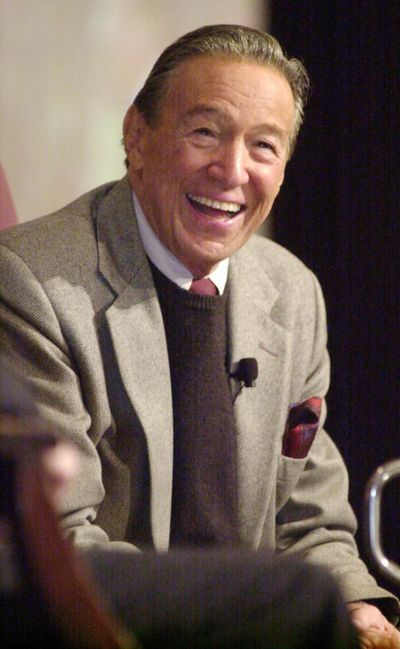‘60 Minutes’ correspondent Wallace, 93, dies

NEW YORK – “Mike Wallace is here to see you.”
The “60 Minutes” newsman had such a fearsome reputation that it was often said that those were the most dreaded words in the English language, capable of reducing an interview subject to a shaking, sweating mess.
Wallace, who won his 21st and final Emmy Award at 89, died Saturday in the New Canaan, Conn., care facility where he had lived the last few years of his life. He was 93.
Wallace didn’t just interview people. He interrogated them. He cross-examined them. Sometimes he eviscerated them pitilessly. His weapons were many: thorough research, a cocked eyebrow, a skeptical “Come on” and a question so direct it took your breath away.
He was well aware that his reputation arrived at an interview before he did, said Jeff Fager, CBS News chairman and Wallace’s longtime producer at “60 Minutes.”
“He loved it,” Fager said Sunday. “He loved that part of Mike Wallace. He loved being Mike Wallace. He loved the fact that if he showed up for an interview, it made people nervous. … He knew, and he knew that everybody else knew, that he was going to get to the truth. And that’s what motivated him.”
Wallace made “60 Minutes” compulsively watchable. His last interview, in January 2008, was with Roger Clemens on his alleged steroid use. Slowed by a triple bypass later that month and the ravages of time on a once-sharp mind, he retired from public life.
During the Iranian hostage crisis in 1979, he asked Iran’s Ayatollah Khomeini – then a feared figure – what he thought about being called “a lunatic” by Egyptian President Anwar Sadat. Khomeini answered by predicting Sadat’s assassination.
Late in his career, he interviewed Russian President Vladimir Putin, and challenged him: “This isn’t a real democracy, come on!” Putin’s aides tried to halt the interview; Putin said he was the president, he’ll decide what to do.
“Many people who weathered a Mike Wallace interview grew to respect him greatly and, you know, have great regard for him because I don’t recall anybody ever saying to me, ‘He took a cheap shot’ or ‘He did the obvious,’ or that he was, you know, playing some kind of game,” Fox News Channel Chairman Roger Ailes said on Sunday. “He actually was trying to serve the audience, and that’s what made him great.”
When a Wallace story found little to back up rumors that Coors beer executives were racist, the relieved company took out newspaper ads trumpeting that it had survived. The ad’s top: “The four most dreaded words in the English language: Mike Wallace is here.”
He was equally tough on public and private behavior. In 1973, with the Watergate scandal growing, he sat with top Nixon aide John Ehrlichman and read a long list of alleged crimes, from money laundering to obstructing justice. “All of this,” Wallace noted, “by the law-and-order administration of Richard Nixon.”
The surly Ehrlichman could only respond: “Is there a question in there somewhere?”
In the early 1990s, Wallace reduced Barbra Streisand to tears as he scolded her for being “totally self-absorbed” when she was young and mocked her decades of psychoanalysis. “What is it she is trying to find out that takes 20 years?” Wallace wondered.
“I’m a slow learner,” Streisand told him.
“He was hands down the best television interviewer ever,” said Steve Kroft, his former “60 Minutes” colleague. “I can’t think of anyone, besides (CBS legend Edward R.) Murrow, who had a greater influence in shaping television journalism.”
“60 Minutes” pioneered the use of “ambush interviews,” with reporter and camera crew corralling alleged wrongdoers in parking lots, hallways, wherever a comment – or at least a stricken expression – might be harvested from someone dodging reporters’ phone calls. Wallace once went after a medical laboratory offering Medicaid kickbacks to doctors in this fashion.
They were phased out after founding executive producer Don Hewitt termed them “showbiz baloney.” “Finally I said, ‘Hey, kid, maybe it’s time to retire that trench coat,” ’ Hewitt recalled.
Wallace’s late colleague Harry Reasoner once said, “There is one thing that Mike can do better than anybody else: With an angelic smile, he can ask a question that would get anyone else smashed in the face.”
Wallace said he didn’t think he had an unfair advantage over his interview subjects: “The person I’m interviewing has not been subpoenaed. He’s in charge of himself, and he lives with his subject matter every day. All I’m armed with is research.”
In addition to his Emmys, Wallace won five DuPont-Columbia journalism and five Peabody awards.
He was married four times. In 1986, he wed Mary Yates Wallace, the widow of his close friend and colleague Ted Yates, who died in 1967. Besides his wife, Wallace is survived by his son, Chris, a stepdaughter, Pauline Dora, and stepsons Eames and Angus Yates.